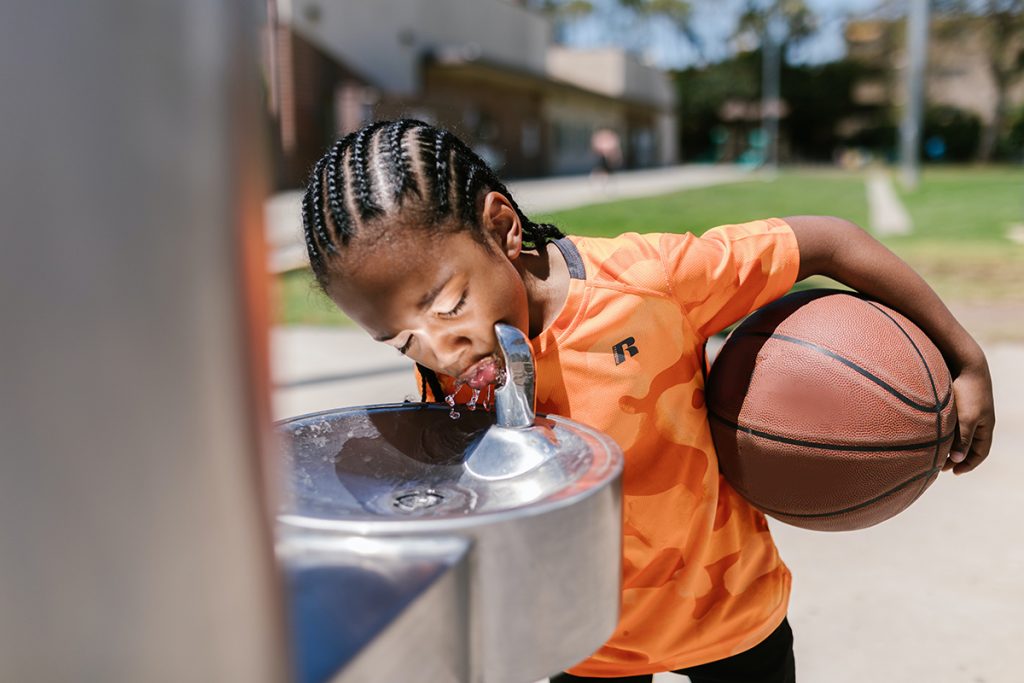
Lead is a toxic metal, and exposure can pose significant dangers to humans, especially during childhood and early development. Studies have shown that lead exposure is associated with cognitive impairment, behavioral and attention issues, as well decreased emotional well-being. One source of potential lead exposure is through drinking water, when water that starts out safe at the treatment facility becomes contaminated by running through lead pipes or leaded valves and soldering joints in drinking faucets and fountains. This is an especially concerning issue in our public school system, where children can be exposed to lead by drinking at water fountains, filling water bottles at faucets, or from water used for food preparation in school kitchens.

Even more troubling, widespread evidence has shown that there are racial and ethnic disparities in lead exposure. Molly Codding, a Community-Oriented Public Health Practice Master of Public Health (COPHP MPH) student is assessing the lead levels and disparities. “Lead exposure is an incredibly important environmental justice issue,” she said. “In the United States, decades of systemic segregation have resulted in a disproportionate burden of lead poisoning and lead exposure for low-income communities and communities of color.”
The first step in eradicating this health disparity and creating safer learning environments for our children is to increase our knowledge about the magnitude of Washington’s problem with lead in school drinking water.
For her MPH capstone, Codding analyzed voluntary school drinking water testing reports from the Washington Department of Health (DOH) and Seattle Public Schools (SPS) Drinking Water Quality Program, in order to assess lead level safety.
Codding found that about one-third of elementary schools across the state tested their drinking water for lead between 2017-2020. Of 551 schools analyzed, 82% reported at least one drinking water faucet or fountain that registered 5 ppb (parts per billion). Numerous schools had lead levels over 100 ppb, and two schools had levels over 1,000 ppb. Codding also found that 17% of all faucets across the state were elevated at 5 ppb or above. The American Academy of Pediatrics recommends 1 ppb lead exposure or lower to ensure health protection for young children. Several states, Canada, and the FDA use a standard of 5 ppb or lower.
Codding’s study also replicated findings in prior studies, by showing evidence for concerning disparities in lead exposure. Schools with the most elevated lead levels included several districts with a higher-than-average number of students of color, as well as more students who received free and reduced lunch (an index of lower family income).
“We’ve seen national attention and outrage focused on the environmental injustice of drinking water lead contamination in Flint, Michigan and Washington, D.C., ” Codding said. “It is important to note that while Washington state does have a lead problem, in our case, it is not because of contaminated water coming from lead service lines. This is good news, because our problem is actually much more easily solved. We can protect our children with only modest financial and infrastructure investment. Simply replacing leaded-brass valves and faucets with parts that contain no lead, or placing certified filters at water outlets, is enough to eliminate this dangerous problem.”
The efforts to translate these findings to new policy and budgetary support from the legislature have been ongoing since 2018. Codding’s capstone research builds upon foundational work conducted by COPHP MPH alum Claire Woosley (2019).
“Unfortunately, the piece of legislation that Claire supported did not pass through the state Senate,” Codding said. “So the bill’s author, COPHP MPH faculty member Rep. Gerry Pollet, needed assistance for the 2021 Legislative Session when he reintroduced HB 1139. This legislation aims to address the testing and remediation of school drinking faucets and fountains in Washington State. Rep. Pollet was able to strengthen the bill in several ways, and I came onto the project in June of 2020.”
“We can protect our children with only modest financial and infrastructure investment. Simply replacing leaded-brass valves and faucets with parts that contain no lead, or placing certified filters at water outlets, is enough to eliminate this dangerous problem.”
— Molly Codding
Codding’s capstone research and literature review is providing support for the legislation. “By providing legislators with memos about lead levels in their home districts, along with the data-driven estimates about how many schools will need remediation, the bill stands a much better chance of being prioritized and supported by House and Senate Committee members,” Codding said. “Fiscal feasibility is always a concern for lawmakers; demonstrating that only a reasonable number of faucets need to be fixed reassures lawmakers that the state can afford to invest in this critical environmental health policy measure.”
An important component of Codding’s capstone is community engagement. To effectively garner public and legislative support for the bill, E2SHB 1139, Codding has fostered relationships with key stakeholders, including: Environment Washington, Washington State Parent Teacher Association, Washington Chapter of American Academy of Pediatrics, Office of Superintendent of Public Instruction, Department of Health, Washington Educators Association and more. “Their input and engagement have been instrumental in building momentum for this bill,” Codding said. “We are committed to ensuring that this is the year that Washington passes some of the nation’s strictest standards for lead in drinking water, and ensures that every school has the resources to test for and fix lead issues in their drinking water.”
Codding is thankful to have had advising on this project from “three amazing mentors”: Rep. Pollet, his aide Kira McCoy (COPHP faculty member and alum ’17), and Dr. Steve Gilbert with the Institute of Neurotoxicology and Neurological Disorders at the University of Washington DEOHS.
Codding hopes that future studies will investigate drinking water lead levels in preschools and day care centers, which can be critical environments for drinking water lead exposure. “Currently, there are no state standards for testing these types of environments,” Codding said. “But children who attend them are even more vulnerable to the lifelong negative health effects of lead exposure. Lawmakers know that the battle to protect these children will be more difficult, as there are not universal channels of funding available to these sites, and it is harder to construct solutions for the diverse types of management and operational entities (e.g., public, private, in-home, community, workplace, etc.).” Even though the struggle will be harder, the approach must remain the same. “It is important to communicate the science and data,” Codding said. “By doing this, we can support Washington state in upholding its commitment to social justice, and in providing a safe learning environment for all Washington students.”
Codding’s journey to focusing on these issues in her capstone work stems from her background in Clinical Laboratory Science, and her passion for environmental health and social equity. Before moving to Washington state to begin her MPH at UW, Codding worked in a 500-bed hospital clinical laboratory setting. She also volunteered extensively for non-profits dedicated to restoring Minnesota waterways, supporting ecological learning for adults and children, and welcoming new refugee neighbors in her community. “I felt fulfillment when working with these communities, but needed to go back to school in order to affect the systems that disproportionately harm our environment and people with less privilege in our society,” Codding said.
“I am not interested in just producing research and public health products. I want my work to be grounded in how it will affect communities I care about.”
— Molly Codding
Regarding her MPH training at UW, Codding said that she feels very fortunate to have excellent advisors and mentors within the program. “COPHP has equipped me to practice radical public health,” she said. “I am not interested in just producing research and public health products. I want my work to be grounded in how it will affect communities I care about.” Over the past two years, Codding has been able to hone these skills by working on projects with Public Health Seattle-King County, the Snohomish Health Department, The Zinn Education Project, and the Washington Board of Health.
Codding will be graduating in Spring 2021. “I am excited and overwhelmed by the question, ‘What next?’”
She said she would love to work in community-centered environmental health practice, whether that be in toxics and environmental exposures, in food justice, or equitable access to nature and green space. She has also been inspired to pursue career opportunities that focus on upstream determinants of health, perhaps via policy research and engagement. “I’m confident that no matter what is available to me, or which avenues I pursue in my job search, I will be an effective practitioner,” Codding said. “Over the last two years, I’ve grown incredible skills, confidence and tenacity, thanks in great part to my classmates, and the challenging format of our learning environment. I’m excited to practice radical public health that helps communities to thrive in the face of systemic racism, classism, and the threat of climate change.”